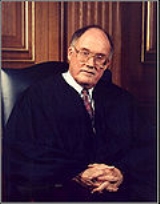
, jurist
, and political figure
who served as an Associate Justice
on the Supreme Court of the United States
and later as the 16th Chief Justice of the United States
. Considered a conservative, Rehnquist favored a conception of federalism
that emphasized the Tenth Amendment
's reservation of powers to the states. Under this view of federalism, the Supreme Court of the United States
, for the first time since the 1930s, struck down
an Act of Congress as exceeding federal power under the Commerce Clause
.
Rehnquist presided as Chief Justice for nearly 19 years, making him the fourth-longest-serving Chief Justice after John Marshall
, Roger Taney
, and Melville Fuller
, and the longest-serving Chief Justice who had previously served as an Associate Justice.
Pregnancy is of course confined to women, but it is in other ways significantly different from the typical covered disease or disability.![]()
This result […] will daily stand as a veritable sword of Damocles over every succeeding president and his advisers.![]()
The Constitution requires that Congress treat similarly situated persons similarly, not that it engage in gestures of superficial equality.![]()
The considered professional judgment of the Air Force is that the traditional outfitting of personnel in standardized uniforms encourages the subordination of personal preferences and identities in favor of the overall group mission.![]()
[Jury selection] is best based upon seat-of-the-pants instincts, which are undoubtedly crudely stereotypical and may in many cases be hopelessly mistaken.![]()
[T]he Constitution does not guarantee the right to acquire information at a public library without any risk of embarrassment.![]()
To the extent that libraries wish to offer unfiltered access, they are free to do so without federal assistance.![]()
The Supreme Court is an institution far more dominated by centrifugal forces, pushing toward individuality and independence, than it is by centripetal forces pulling for hierarchical ordering and institutional unity.![]()

